Top 9 Comoros Culture, Customs, and Etiquette
Comoros is officially referred to as the Union of Comoros and it is an independent archipelago island country in the Indian Ocean. Comoros has diverse culture ... read more...from its religion, food, fashion, music and even architecture. All these aspects of culture portray a mixture of diverse cultures that were brought into the country by French, Portuguese, and Arab traders. Here are some aspects of Comoros culture, customs, and etiquette.
-
The inhabitants dress whichever they like despite the French influence. Most Comorians dress in western fashion, while older individuals, notably elders, frequently wear traditional garb. Shiromeni, a long, colored dress with a skirt, is a common item of clothing for women. Comorian ladies will often cover their faces with colorful shawls or scarves. Another method Comorian women dress is by applying a "beauty mask" to their faces made of sandalwood and coral paste. Although some Comorian women choose not to do so, doing so produces a sort of creamy, white paste that they apply to their faces.
In the Comoros, men dress in cotton clothes with skirts that reach their knees. Because of the oppressive heat in Comoros, they occasionally wear a white jacket and a white skull cup. Men wear sarongs, which are long, patterned skirts, when they leave town. Young guys do, however, prefer to wear conventional western attire to that of their own type. However, older people like wearing traditional Comorian attire.
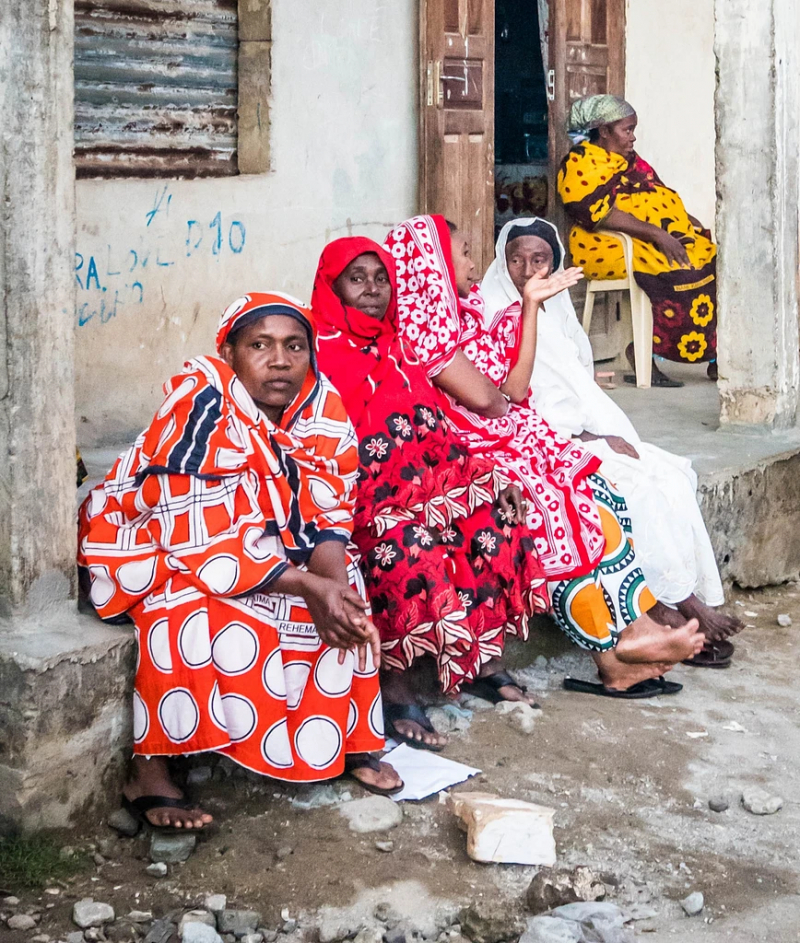
afroculture.net 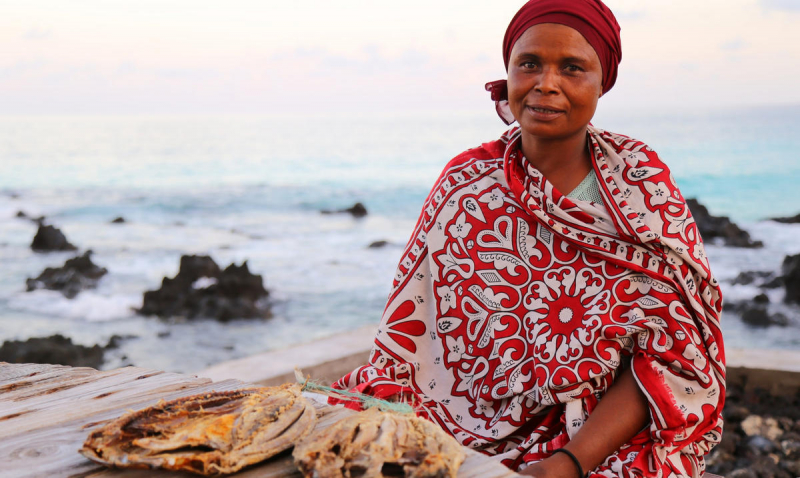
pinterest.ca -
The Grand Marriages usually takes place from the months of July-September, after the “small wedding” in about 10-20 year or until the couple has saved enough money for this, a “Grand Marriage” must take place to obtain a social status. This is a week or two celebration usually occurs between the months of July-September, but preparations for the wedding take about a minimum of 6 months to 10 years. As per tradition, the Grand Mariage should cost more than the grand wedding of a relative or a friend that took place before yours and it could cost up to 20,000 euros. Comorans take pride in this Grand Mariage, they would save over time and spend it one lavish wedding.
If you marry outside this custom, you would not gain any respect from the people and the community even the President of the Republic. Comoran women want a grand marriage more than men, as it just not helps them acquire high social status, but they would gain a huge sum of fortune from the groom. Comoran ranks as #1 in countries that have influential women and women are highly respected and honored in their country.
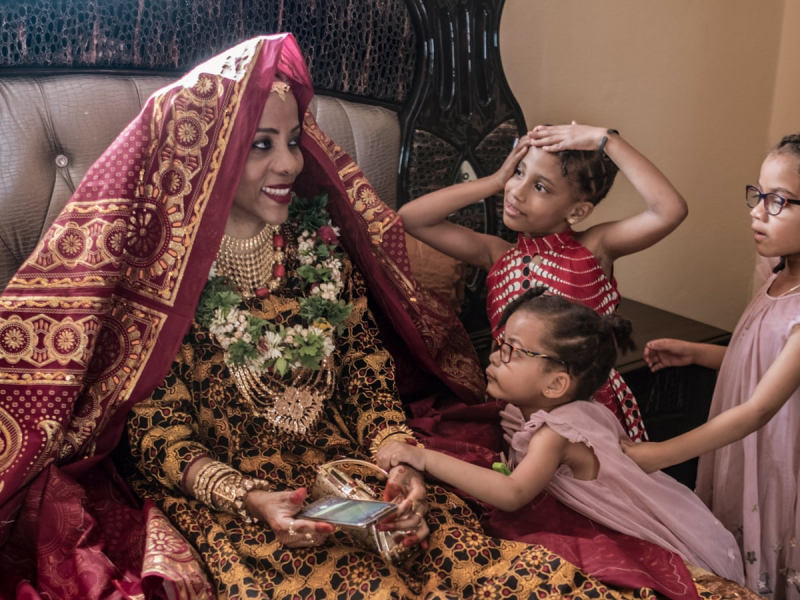
myvirtualworldtrip.com 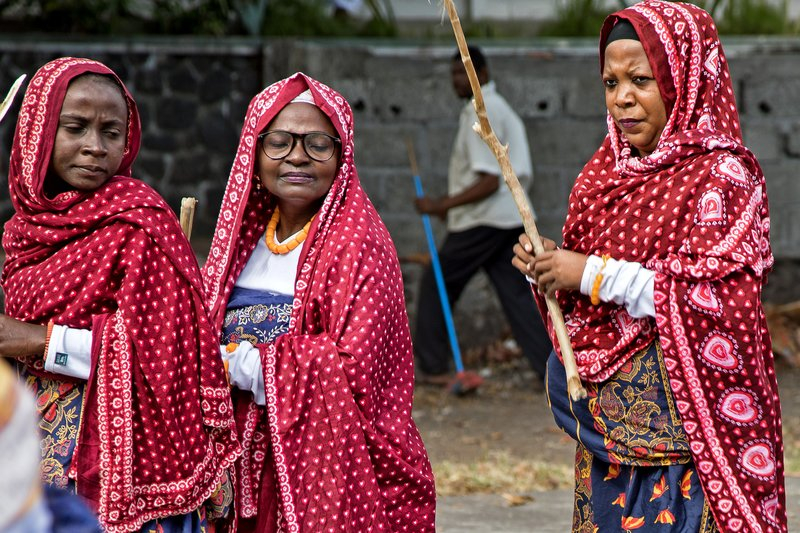
grete-howard.travellerspoint.com -
Comorian men shake hands whenever they meet another man, but in public, at least, they greet women only verbally because touching women in public is considered improper. In private and among relatives, men and women may sometimes kiss one another on the cheek. Women might also greet their female friends with a kiss.
Upon greeting, Comorians exchange any of several standard phrases, depending on the level of formality. The Shingazidja version of an exchange between social equals is Edje? (an informal “Hello”) followed by Ye yapvo? (“What’s up?”). More formal terms are used to greet elders, superiors, or strangers. Bariza husha (“Good morning”), Bariza hazi? (“How’s work?”), and Bariza masihu (“Good evening”) are all common Shingazidja phrases.
When calling out to someone, Comorians often say Bo before the person’s name. A child shows respect to his or her elders by greeting them with both hands cupped and extended while saying Kwezi. In response, the elder clasps the child’s hands and says Mbona. The exchange is like asking for and receiving a blessing.
Comorians make frequent informal visits to close friends; it is impolite to lose contact with any friend or family member for more than a few days. Extended families are large, so social obligations are numerous. Within a village, Comorians visit freely without prior arrangement; time for visiting is usually set aside from 4 to 6 pm. When visiting someone in another town, it is polite to give advance notice to allow the hosts time to prepare. Guests are offered food and drink, which it is impolite to refuse. Weekday visits are short (an hour or less) but weekend ones may last all day.
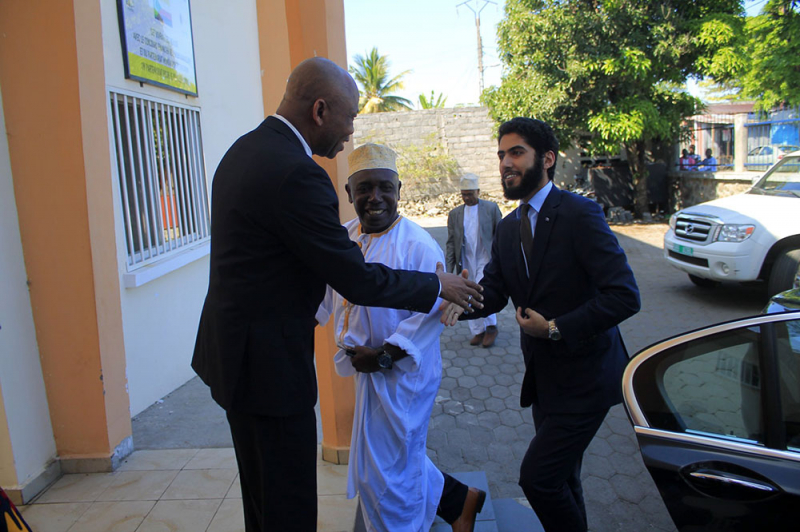
oec-oce.org 
freepik.com -
In Comoros, the extended family is typically large, especially in villages where polygamy is common. Men are in charge of family finances and property, while women take control of the household. Men do little domestic work; they farm or fish for the family’s subsistence. Women seldom leave home except to do chores or for holidays, although some women in urban areas do work outside the house.
Children use their father’s given name as their surname. At about age 18, sons might build themselves a paillotte (thatched hut) near the family home. They still eat at home and take part in family activities, but sleep and entertain guests at their own dwelling. Daughters live at home until they marry. Small children are cared for by older sisters, and elders live with their adult children when they can no longer live alone.
Individual needs are subordinate to those of the family in Comoros. People expect to share in both the successes and failures of family members. Within the larger community, sharing wealth is a way to increase one’s social standing and influence.
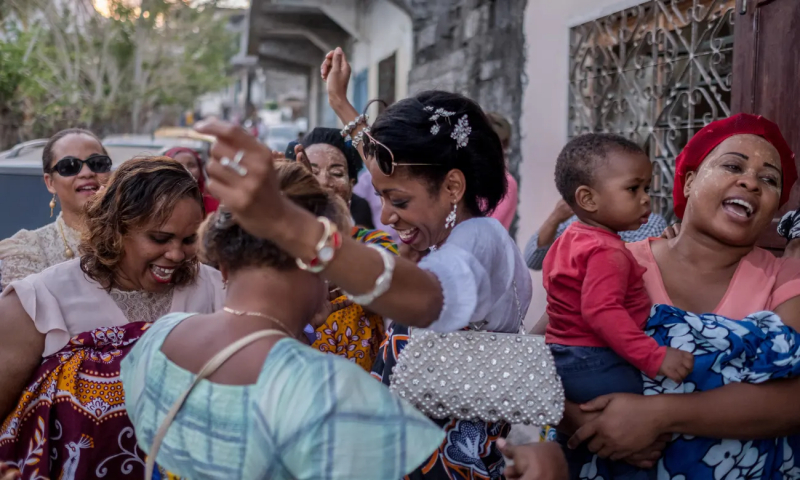
boredpanda.com 
humanium.org -
In Comoros, locals usually use automatic and manual cars. Each type of car has its advantages, automatic cars are easier to use and significantly reduce the risk of stalling, while manual transmission vehicles are cheaper to maintain and have better fuel efficiency and better control.
The speed limits vary depending on the type of road you are driving on—most of the country's specific speed limits are by road hierarchy. When driving on urban roads, the maximum speed limit is 30 km/h, but if you are in the city, the maximum speed limit is 60 km/h. If you're on a highway or freeway, you can drive up to 120 km/h. It is essential to stick with the set speed limit to have a quicker response in a dangerous situation and have ample time to stop.
Every intersection poses dangers to all road users - to motorists, pedestrians, and cyclists. Crossings in Comoros have become the place of severe collisions due to various factors such as a large amount of traffic converging in one area. As a driver, you need to follow the right directions and also slow down at intersections. Check traffic signs and different pavement markings.
You may wonder whether driving in Comoros is on the right or the left side of the road. For most British colonies, driving is on the left side of the road. However, driving in the Comoros Islands is on the right of the road, just like most Asian countries such as the Philippines and Vietnam. So, do not be confused if you are driving on the left side of your home country’s road.
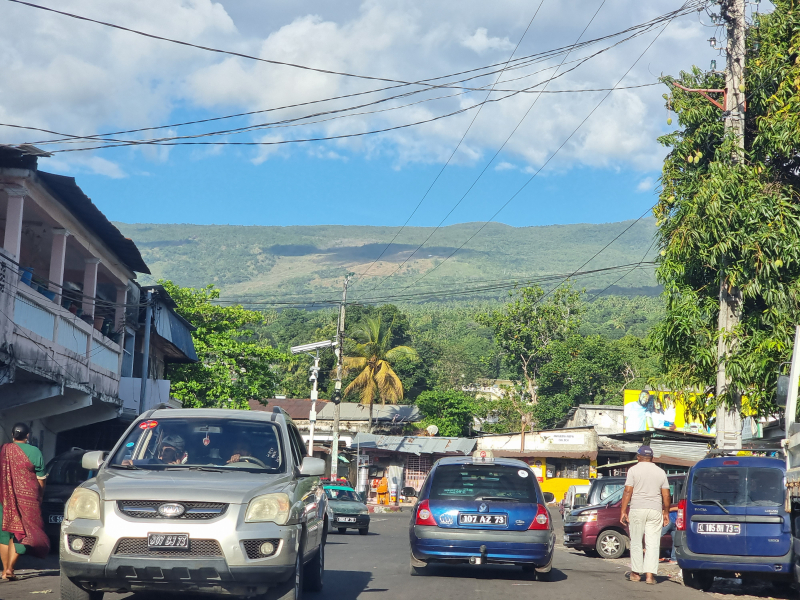
roadto197.com 
here.com -
Tipping In Comoros is part of the culture and you should be tipping in restaurants, taxi tipping, hotel tipping, massage tipping, and more in Comoros. While it is normal to tip in Comoros to the different service providers, if the service you are receiving is not good, you may decide to give a tip lower than what is stated as the normal tipping amount and even decide not to give any tip at all.
- In restaurants, 95% of people in the Comoros tip between 10% and 22%. The actual tipping percentage is determined by the level of service provided in the restaurant, and it can be greater than 10% if the service was poor or less than 22% if the service was excellent.
- The average tipping percentage for a taxi driver in the Comoros is between 8% and 20%. The actual tipping percentage is determined by the level of service provided by the taxi driver, and it can be greater than 8% if the service was poor or less than 20% if the service was poor). Typically, it will be between $3.00 and $5.00 USD.
- The average tipping percentage in hotels in the Comoros is between 2.00 and 5.00 USD/EURO/GBP. The actual tipping percentage is determined by the level of service provided at the hotel, and it can be higher than 2.00 if the service was poor or lower than 5.00 if the service was excellent. The bellboy is usually paid about $2.00 USD/EURO/GBP per piece of luggage.
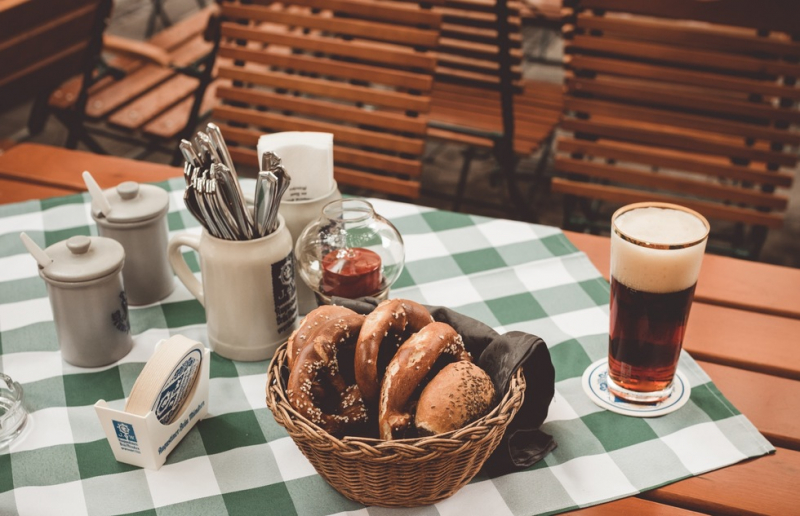
tripsavvy.com 
go2africa.com -
The slow pace of island life is a typical aspect of doing business in the Comoros, where nothing happens too quickly or professionally. Business dress is tidy but fairly casual, although, as it is an Islamic country, women are expected to dress conservatively. Women are traditionally subservient to men and do not generally hold key positions in business in Comoros, so visiting businesswomen may find that they are not treated with the same respect as their male counterparts. Comorians avoid raising their voice in a work environment – and certainly, avoid using bad language – keeping their tone as neutral as possible. It’s also disrespectful to interrupt other people when they’re speaking.
Business is usually conducted in French, and occasionally in Arabic, but few people speak English. Business hours are generally from 7:30 a.m. to 2:30 p.m. Monday through Thursday (with some businesses staying open until 5:30 p.m.), Fridays until 11 a.m. (Islamic holy day), and Saturdays from 7:30 a.m. to 12 p.m. During the holy month of Ramadan, very little business is conducted.

cornerstonerpo.com 
jwflegal.com -
Comorians eat mostly imported rice, usually with a fish or meat sauce. The main source of protein is plentiful local fish (tuna, barracuda, wahoo, and red snapper). Cassava can be fried, boiled, or grilled. Meats that are popular include chicken, goat, and imported beef. Islam forbids eating pork. Comorians season their food with putu, a hot pepper sauce. Tomatoes, onions, cucumbers, and green beans are available in urban markets. Cloves, cinnamon, saffron, and cardamom are examples of indigenous spices. Water, tea, and fruit juice are served with meals.
Most Comorians who eat breakfast have cold leftovers and hot, sweet tea. The afternoon meal consists of a sauce-covered starchy food, such as cassava or green bananas, and some meat. Dinner is the main course, which usually includes a rice dish.
Affluent families in cities eat at a table. Otherwise, families eat cross-legged on a mat around several communal plates of food. Women typically eat separately from men in rural areas, especially when guests are present. Only family members and close friends are invited to eat with the family.
Comorians wash their hands in a bowl of water before and after eating. Food is served buffet-style at large gatherings, and guests stand and take food from many different plates. Nobody eats until a brief blessing is given. While some urban men eat at restaurants when they cannot get home for lunch, most Comorians (especially in rural areas) consider eating out embarrassing—it implies the person is poorly fed at home, has no family, or has marital problems.
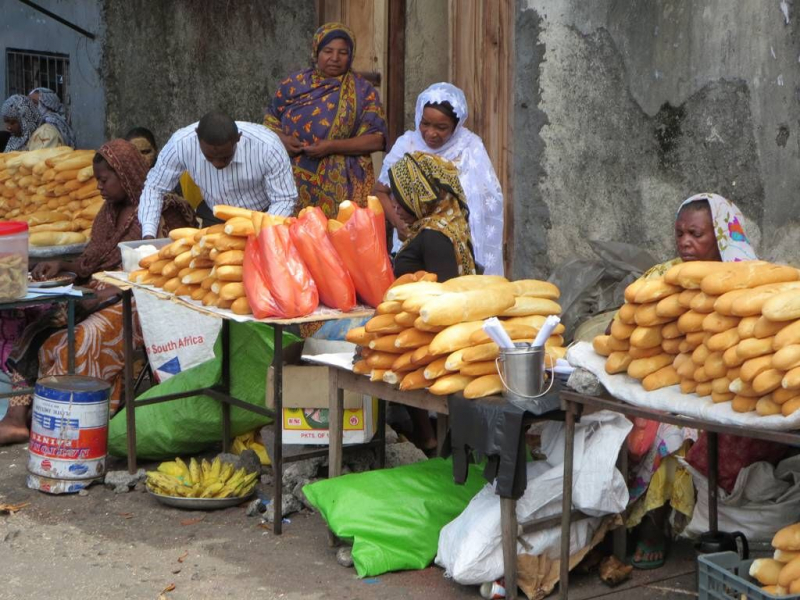
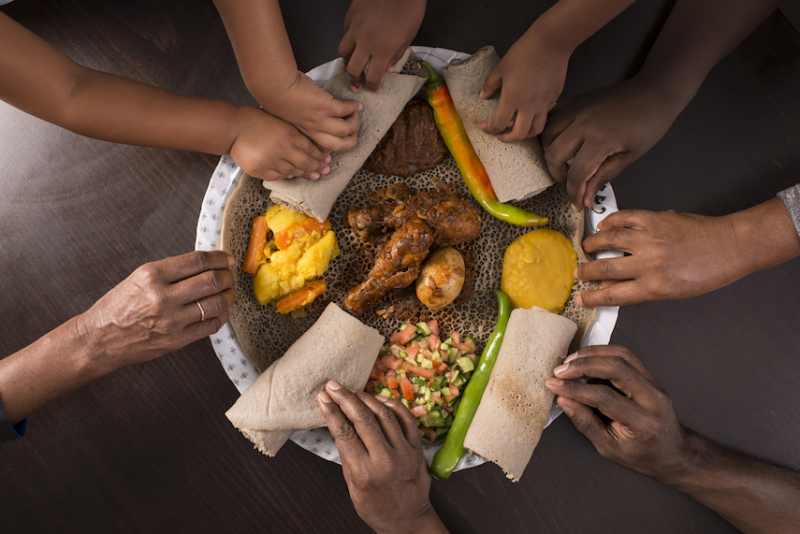
bettertogetherbc.ca -
According to the 2006 estimate by the U.S. Department of State, roughly 98% of the population in Comoros are Muslim. Islam and its institutions have helped to integrate Comorian society and provide identification with a world beyond the island's shores. Most adherents are Arab-Swahili or Persian, but there are also people of Indian descent.
Comorians follow religious observances conscientiously and strictly adhere to religious orthodoxy. During colonization, the French did not attempt to supplant Islamic practices and were careful to respect the precedents of sharia as interpreted by the Shafi'i school of thought.
Christianity in Comoros is a minority religion. Roman Catholics in Comoros are about 6000 (0.8% of the population). Protestants are about 1,678 persons (about 0.25% of the population). The constitution guarantees religious liberty.
A small number of Indians in Comoros are Hindu. Hinduism in both the independent Comoros and Mayotte plays a very small part in the islands' cultures, which are based on Islamic principles and local customs. However, Indian Hindus have contributed to the economy of the islands, most of them working as jewelers.
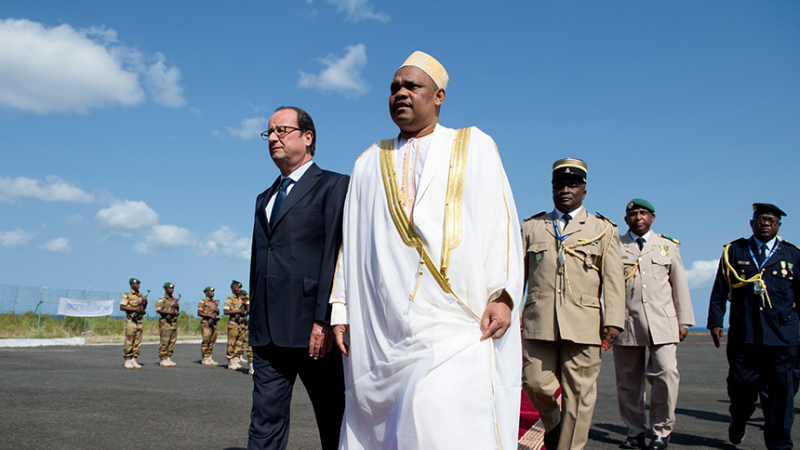
newafricanmagazine.com 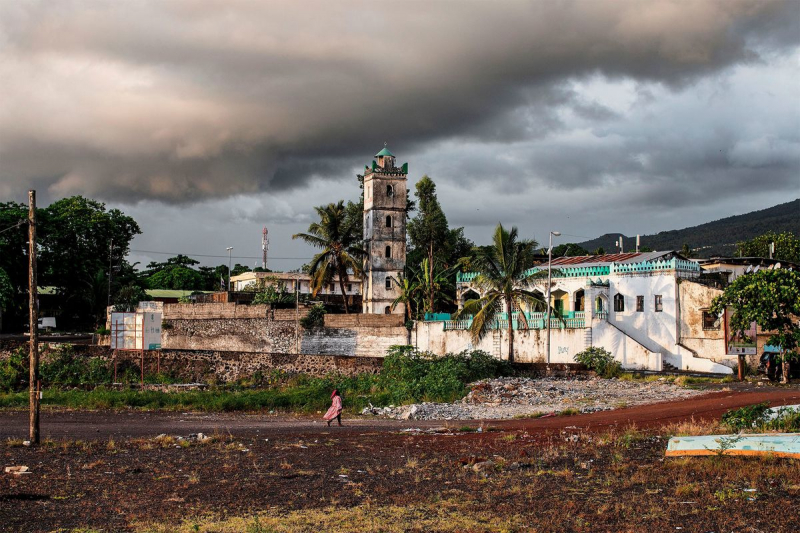
bloomberg.com






























